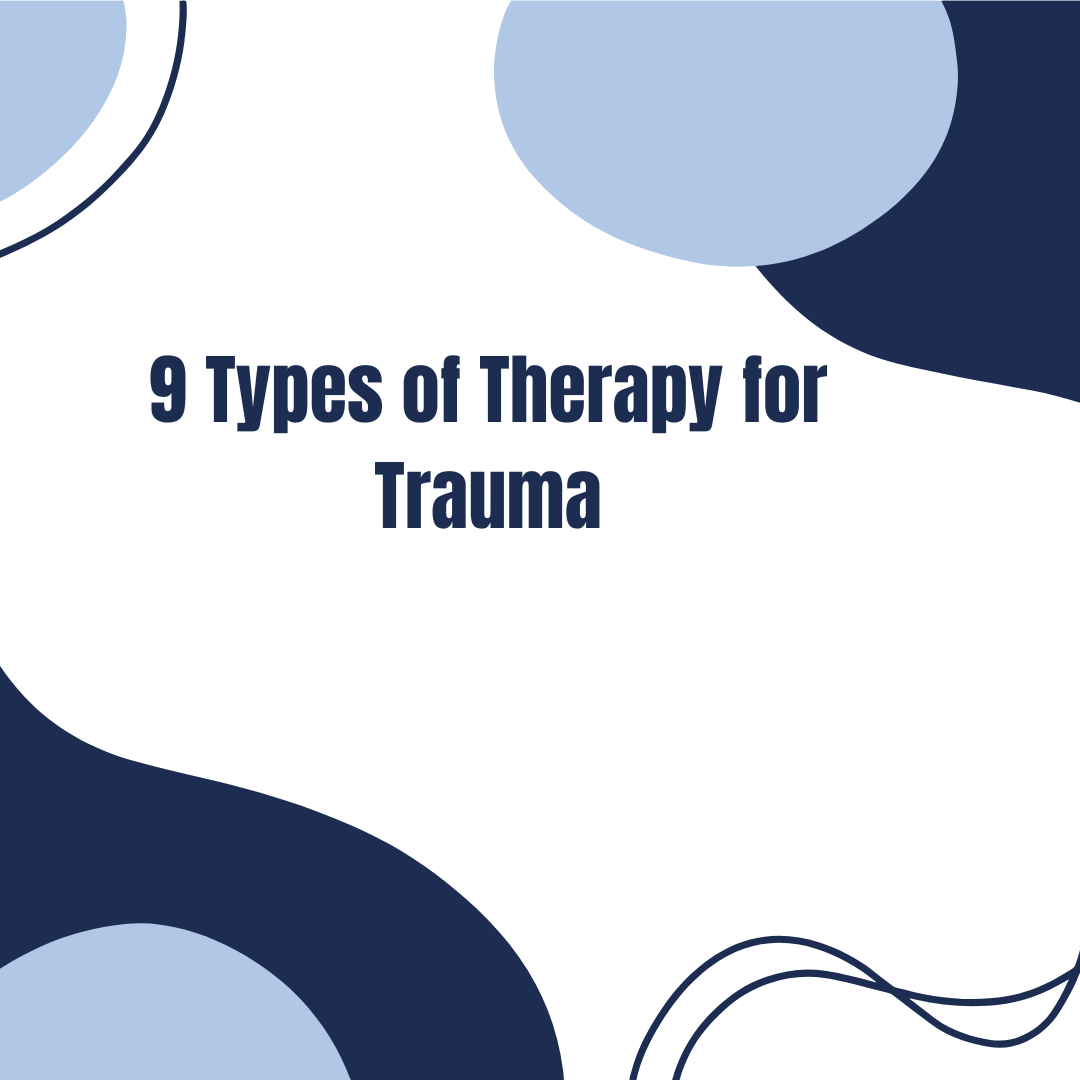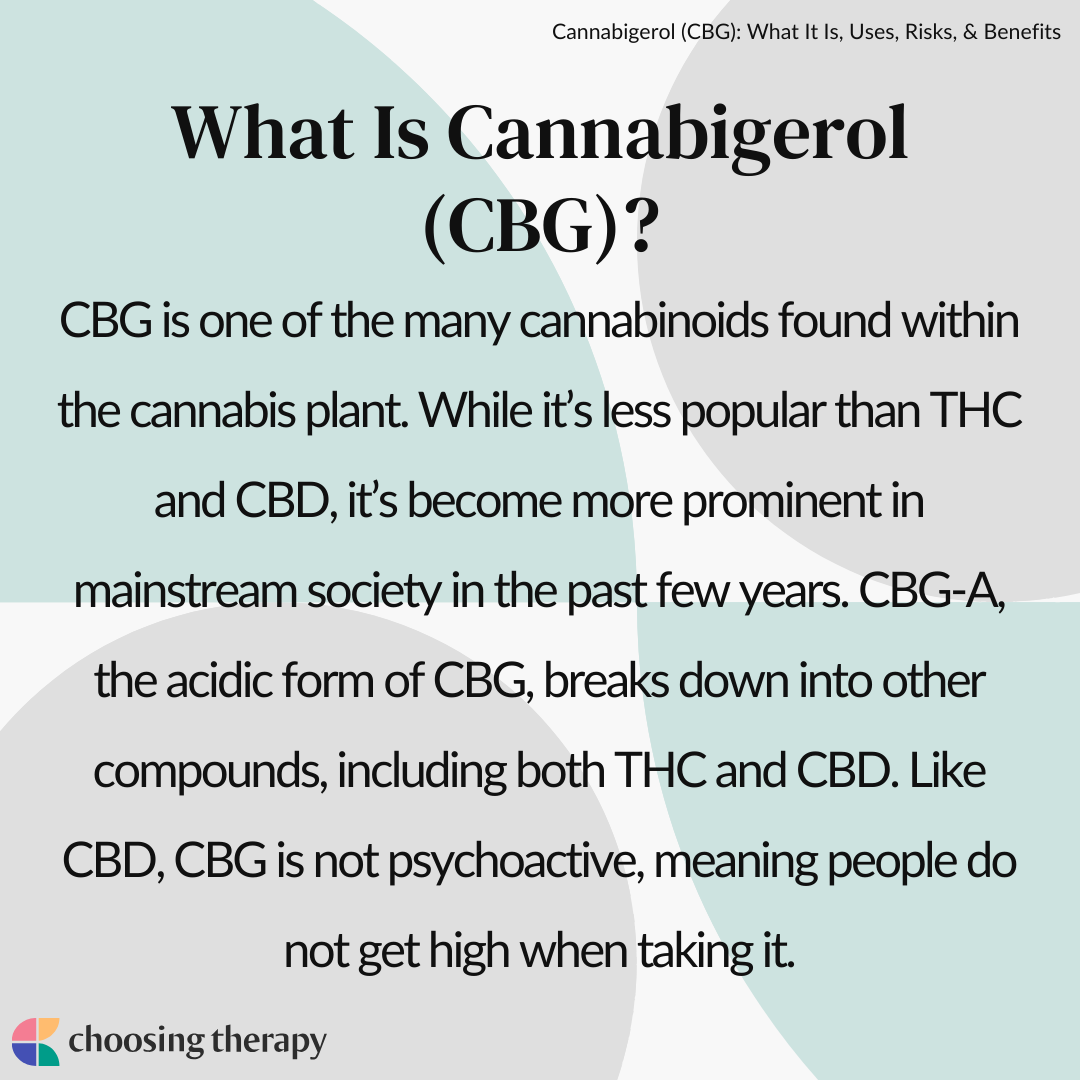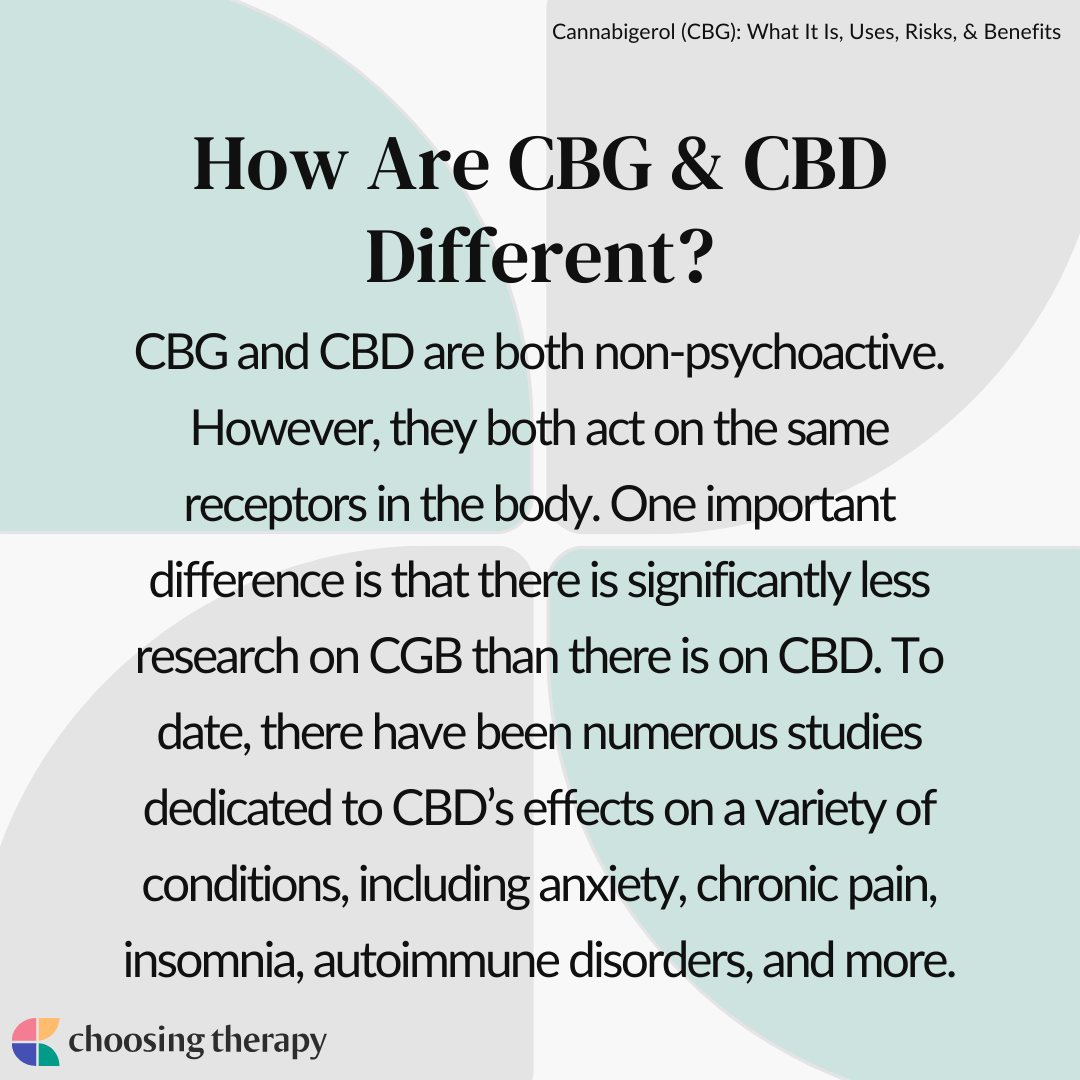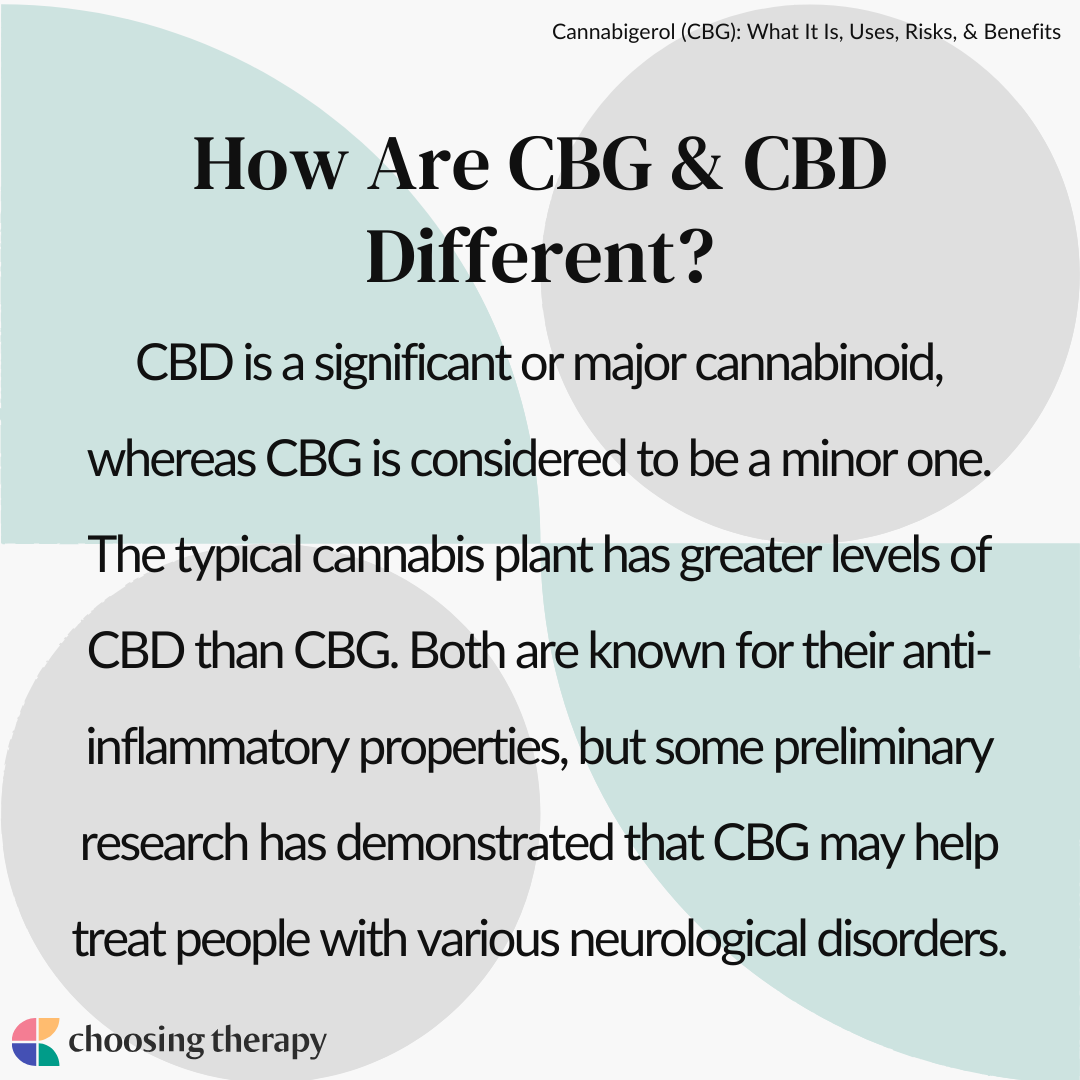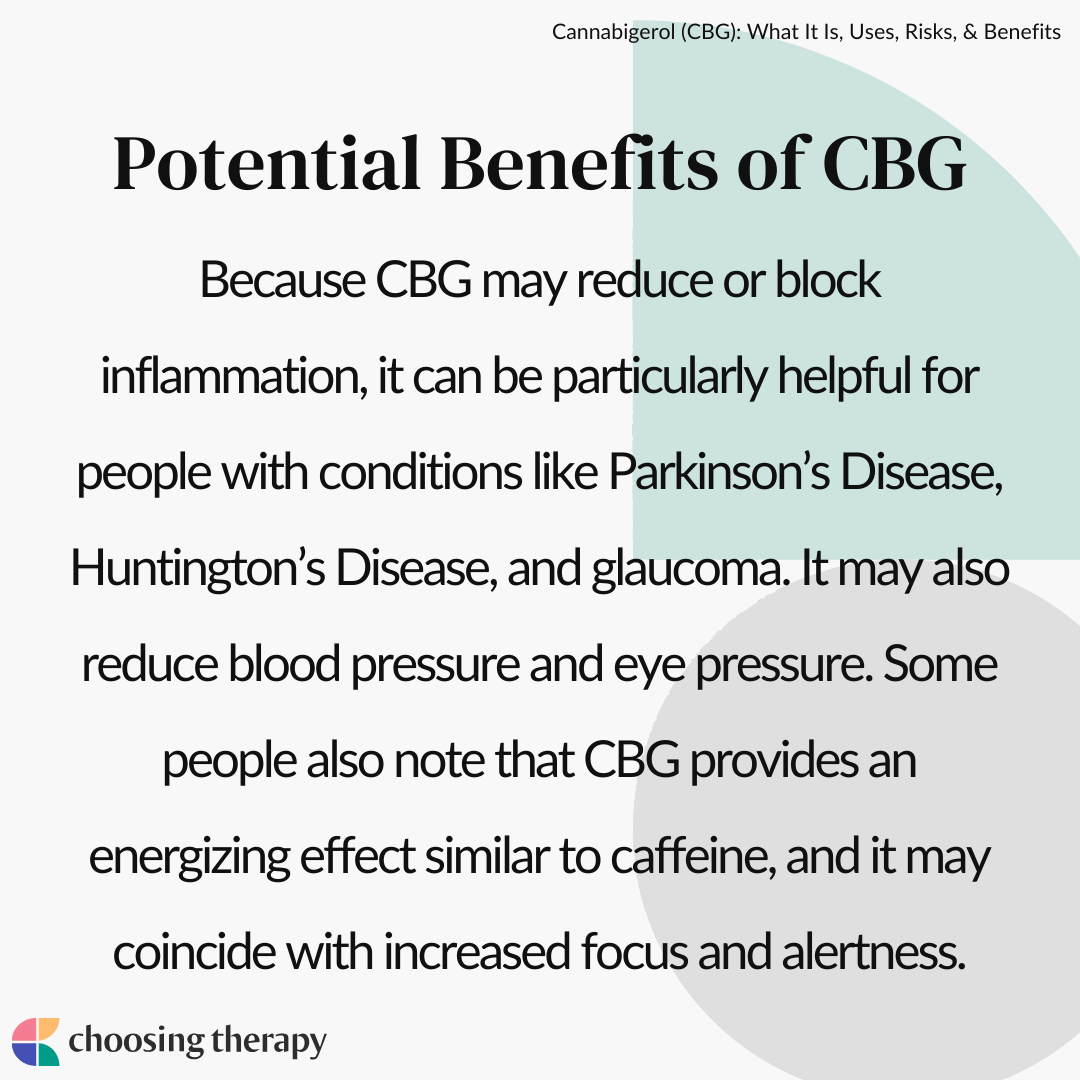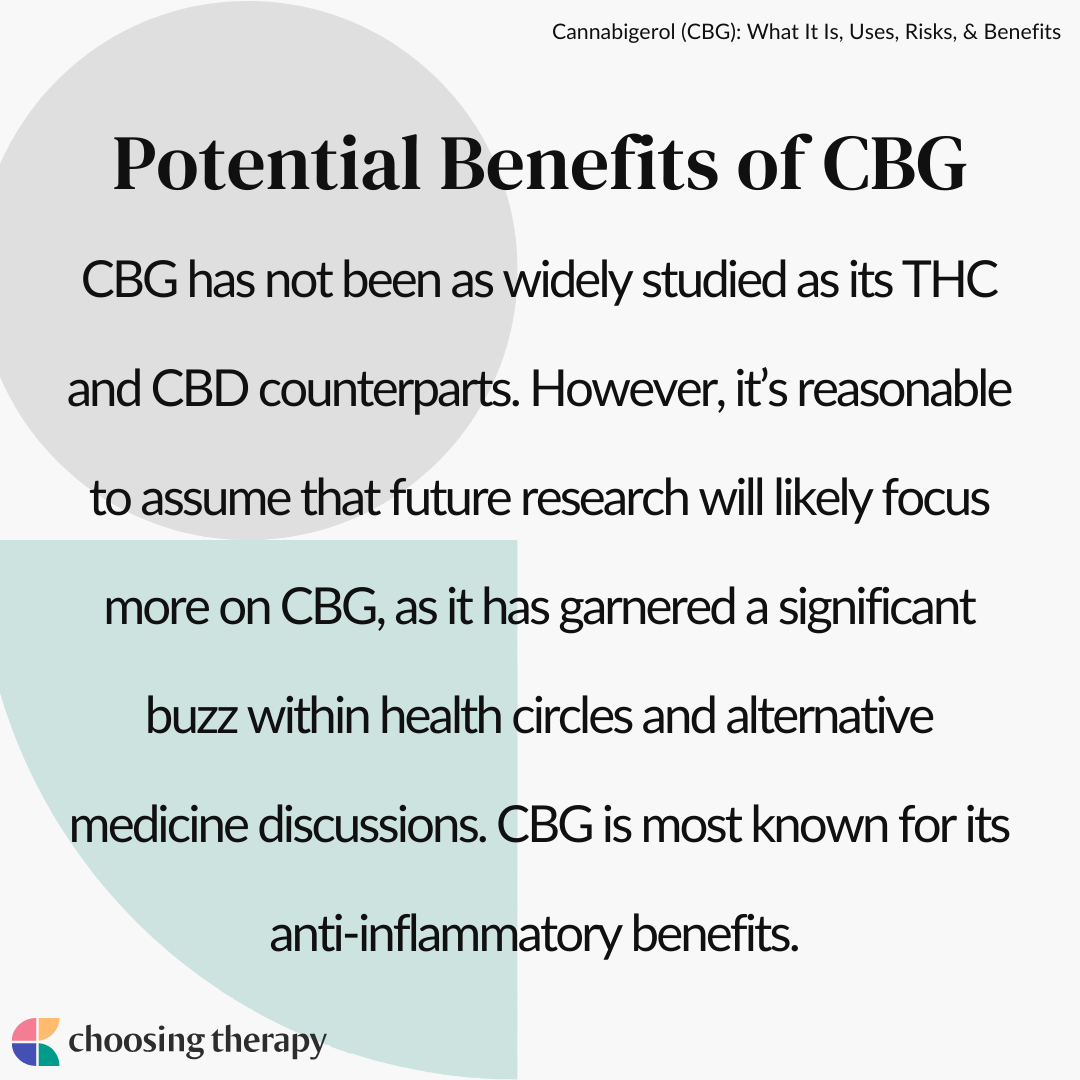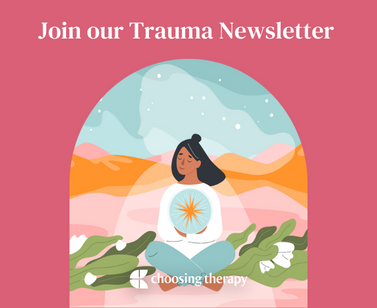Cannabigerol (CBG) is a biologically active compound found within the cannabis plant. Although there’s less CBG in cannabis plants than THC and CBD, other cannabinoids are derived from cannabigerol acid.1 This specific strain of cannabis isn’t commonly found in mainstream products, but it’s become more popular for treating various mental and physical health conditions.
Experience the medically proven power of psychedelics from your own space Nue.life offers at-home oral ketamine therapy for you to heal from mental health conditions with a home turf advantage. Over 2/3 of all Nue Life clients report more than 50% reduction in depression, anxiety, and PTSD symptoms and it’s 60 to 80% cheaper than in-clinic therapy. Learn More
What Is Cannabigerol (CBG)?
CBG is one of the many cannabinoids found within the cannabis plant. While it’s less popular than THC and CBD, it’s become more prominent in mainstream society in the past few years. CBG-A, the acidic form of CBG, breaks down into other compounds, including both THC and CBD. Like CBD, CBG is not psychoactive, meaning people do not get high when taking it.2
It’s estimated that most plant strains only contain 1% CBG.3 CBG is generally administered via an oil, although such products can be costly and hard to find. For this reason, most people tend to use CBD oil. Others may consume CBG by directly smoking marijuana (THC). CBG acts on the endocannabinoid system.
How Are CBG & CBD Different?
CBG and CBD are both non-psychoactive. However, they both act on the same receptors in the body.4 One important difference is that there is significantly less research on CGB than there is on CBD. To date, there have been numerous studies dedicated to CBD’s effects on a variety of conditions, including anxiety, chronic pain, insomnia, autoimmune disorders, and more.
CBD is a significant or major cannabinoid, whereas CBG is considered to be a minor one. The typical cannabis plant has greater levels of CBD than CBG.5 Both are known for their anti-inflammatory properties, but some preliminary research has demonstrated that CBG may help treat people with various neurological disorders.6
Is CBG Stronger Than CBD?
As mentioned, neither CBG nor CBD contains psychoactive properties. CBD is more potent than CBG, but it’s important to consider that they have different therapeutic benefits. For example, someone might be more likely to use CBD for pain management, anxiety, or sleep problems. And while there’s less research on CBG, it may be more effective in treating colitis, multiple sclerosis, and Huntington’s disease.
How Does CBG Work?
CBG works by binding to the cannabinoid receptors in the brain. The body contains the CB1 receptors, which are found in the brain and nervous system. It also contains the CB2 receptors within the immune system. By binding to both receptors, it can induce anti-inflammatory effects and also may promote a state of calmness and relaxation.1
How Does CBG Make You Feel?
People don’t get high when they take pure CBG. The specific emotional effects people experience vary. For instance, some may feel an increased sense of focus and alertness. Others may notice the opposite effect of feeling more tired. Finally, some people won’t notice much of an effect unless the CBG is also mixed with CBD or THC.
How Is CBG Consumed?
CBG can be consumed in various forms. It can be smoked in its flower form, ingested sublingually (under the tongue) from a tincture, or vaped in a wax or oil form. It may also be orally consumed via gummies or other edible products. Some people also apply it topically through specific lotions and body butters.
The route of administration impacts how fast someone feels the specific effects of CBG. For example, smoking this product will cause a faster reaction than taking it via an edible. However, smoking and vaping have inherent risks to the lungs, heart, and throat. Mixing CBG with THC will also produce psychoactive effects.
Potential Benefits of CBG
Because CBG may reduce or block inflammation, it can be particularly helpful for people with conditions like Parkinson’s Disease, Huntington’s disease, and glaucoma. It may also reduce blood pressure and eye pressure. Some people also note that CBG provides an energizing effect similar to caffeine, and it may coincide with increased focus and alertness.
As mentioned, CBG has not been as widely studied as its THC and CBD counterparts. However, it’s reasonable to assume that future research will likely focus more on CBG, as it has garnered a significant buzz within health circles and alternative medicine discussions. CBG is most known for its anti-inflammatory benefits.
Anxiety & Depression
CBG may reduce symptoms of anxiety and depression. It may be used as a standalone treatment instead of conventional pharmaceutical options. However, it may also be combined with other forms of medication and professional treatment. One small, self-reported survey found that 80% of respondents found CBG more helpful for treating depression and anxiety than conventional medicines.7
Ketamine Program For Depression, Anxiety, and Trauma Nue.life offers an at-home, evidence-based ketamine program supported by hundreds of clinical studies. Our clients feel rapid & lasting relief within hours after the first treatment. Learn More
Chronic Pain
CBG contains anti-inflammatory and pain-resolving properties. Taking CBG may help reduce symptoms of chronic pain associated with autoimmune disorders and acute injuries. One small study showed that 73% of respondents preferred CBG over conventional chronic pain medicines. Although more research is needed, it may be recommended as an over-the-counter pain treatment.8
Inflammatory Bowel Disease (IBD)
It’s estimated that anywhere from 15-40% of people with IBD use cannabis and cannabinoids as part of their treatment. Researchers have determined that CBG may be beneficial for treating IBD patients. Preliminary research on rodents has found that CBG significantly reduced inflammation by attenuating murine colitis and reducing nitric oxide production.9
Glaucoma
Research shows that individuals with heightened eye pressure may be at an increased risk for developing glaucoma.10 However, cannabinoids have neuroprotective properties that may help support the treatment of glaucoma. Because cannabis strains may lower the amount of this pressure, this may positively influence the progression or severity of glaucoma.
Huntington’s Disease
Huntington’s disease is a rare genetic condition that refers to a progressive degeneration of nerve cells in the brain. Some preliminary studies show that CBG may yield positive therapeutic benefits in treating neurological disorders, including Huntington’s disease. It may help alleviate the more severe symptoms and potentially delay disease progression.11 Further research is still needed.
Cancer
CBG has been reported to decrease cell proliferation in various cancer cell lines, including prostate, breast, thyroid, and colorectal carcinoma.12 While further research is needed, preliminary studies show that CBG may kill off various inflammatory cells coinciding with developing cancer. CBG can also ease discomfort associated with cancer treatments, including chemotherapy.
Bacterial Infections
One recent study found that CBG displays antibacterial properties. In particular, CBG has an antimicrobial effect against streptococcus mutans, streptococcus sanguis, and methicillin-resistant Staphylococcus aureus (also known as MRSA).13 MRSA is a drug-resistant bacteria that contributes to staph infections, so these findings may be particularly important to consider in future medical research.
Potential Risks of CBG
Like any substance, there are risks associated with taking CBG. First and foremost, it’s important to consider where you source this product. If you plan on using CBG, ensure that you buy from a reputable company that clearly outlines its ingredients. Potency varies, so be mindful of how much and how often you dose.
One of the main risks of CBG is that it may contain trace amounts of THC, and unintentionally taking THC can result in unwanted psychoactive effects. Similarly, it’s possible to build a tolerance to cannabis, particularly if you’re mixing CBG with THC. This can result in patterns of dependence and/or withdrawal.
Side Effects Of CBG
The side effects of CBG tend to be mild, and many people report no adverse events. Research shows that the most typical side effect is dry mouth followed by sleepiness and increased appetite. The majority of people do not experience any withdrawal symptoms, although some people may note some sleep problems after discontinuing CBG.14
Common side effects of CBG include:
- Dry mouth
- Changes in appetite
- Dizziness
- Gastrointestinal distress
- Headaches
- Drowsiness
When to Seek Professional Help
If you frequently use cannabis or other drugs to self-medicate mental health symptoms, you may benefit from seeking professional support. Drug use may provide temporary relief, but chronic use could exacerbate emotional distress and cause other problems associated with social isolation, shame, and guilt. Over time, you may find it increasingly hard to stop your use, even if you want to cut back or abstain.
A therapist specializing in addiction may be a good starting point- you can look through our online therapist directory or online therapy platform to find a provider. You may also want to review psychiatric medication options. Most psychiatrists offer both in-person and online psychiatry options as part of their medication management treatment.
In My Experience
To help our readers take the next step in their mental health journey, Choosing Therapy has partnered with leaders in mental health and wellness. Choosing Therapy is compensated for marketing by the companies included below. Online Therapy BetterHelp – Get support and guidance from a licensed therapist. BetterHelp has over 25,000 therapists who provide convenient and affordable online therapy. Take A Free Online Assessment and get matched with the right therapist for you. Free Assessment Online PTSD treatment Talkiatry offers personalized care from psychiatrists who listen and take insurance. Get matched with a specialist in just 15 minutes. Take our assessment. Treatment For Trauma & OCD Half of people diagnosed with OCD have experienced a traumatic life event. The chronic exposure to stressful situations, such as ongoing bullying, or an abusive relationship can lead to the development of OCD symptoms. NOCD therapists specialize in treating both trauma and OCD and are in-network with many insurance plans. Visit NOCD Trauma & Abuse Newsletter A free newsletter for those impacted by trauma or abuse. Get encouragement, helpful tips, and the latest information. Sign Up Choosing Therapy Directory You can search for therapists by specialty, experience, insurance, or price, and location. Find a therapist today.Additional Resources
How Does ERP Help With Intrusive Thoughts? Obsessive compulsive disorder (OCD) is a psychiatric condition marked by the presence of obsessive thoughts, images, doubts, or urges, followed by compulsive behaviors or acts aimed at easing the distress caused by the obsession. While the content of the obsessions can take many forms, they are always repetitive, persistent, involuntary, and intrusive, and they often result in a great deal of anxiety for the person experiencing them. 9 Types of Therapy for Trauma Experiencing trauma can result in distressing and debilitating symptoms, but remind yourself that there is hope for healing. If you or a loved one is suffering from the aftereffects of trauma, consider seeking therapy. Trauma therapy can help you reclaim your life and a positive sense of self. 
